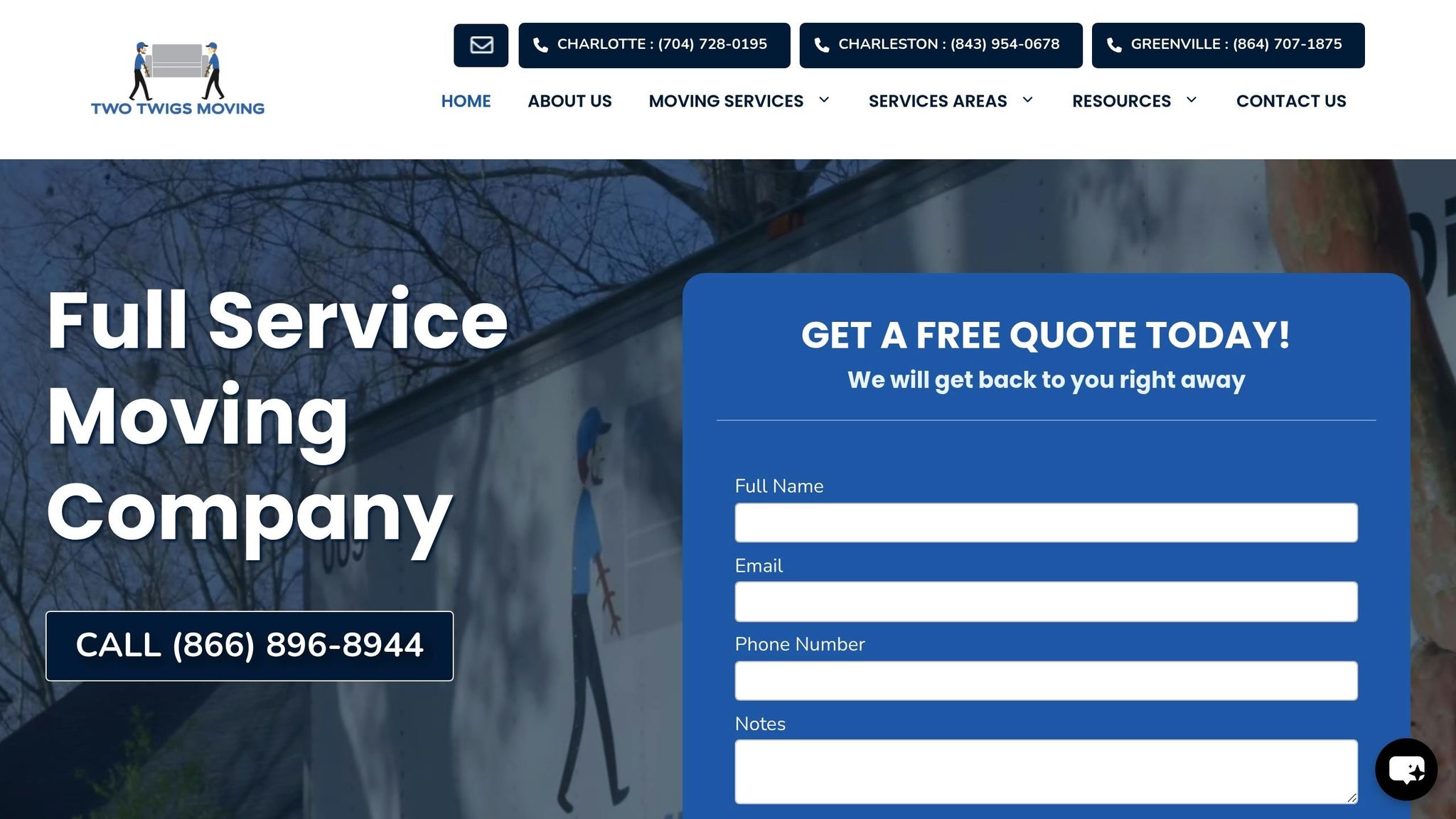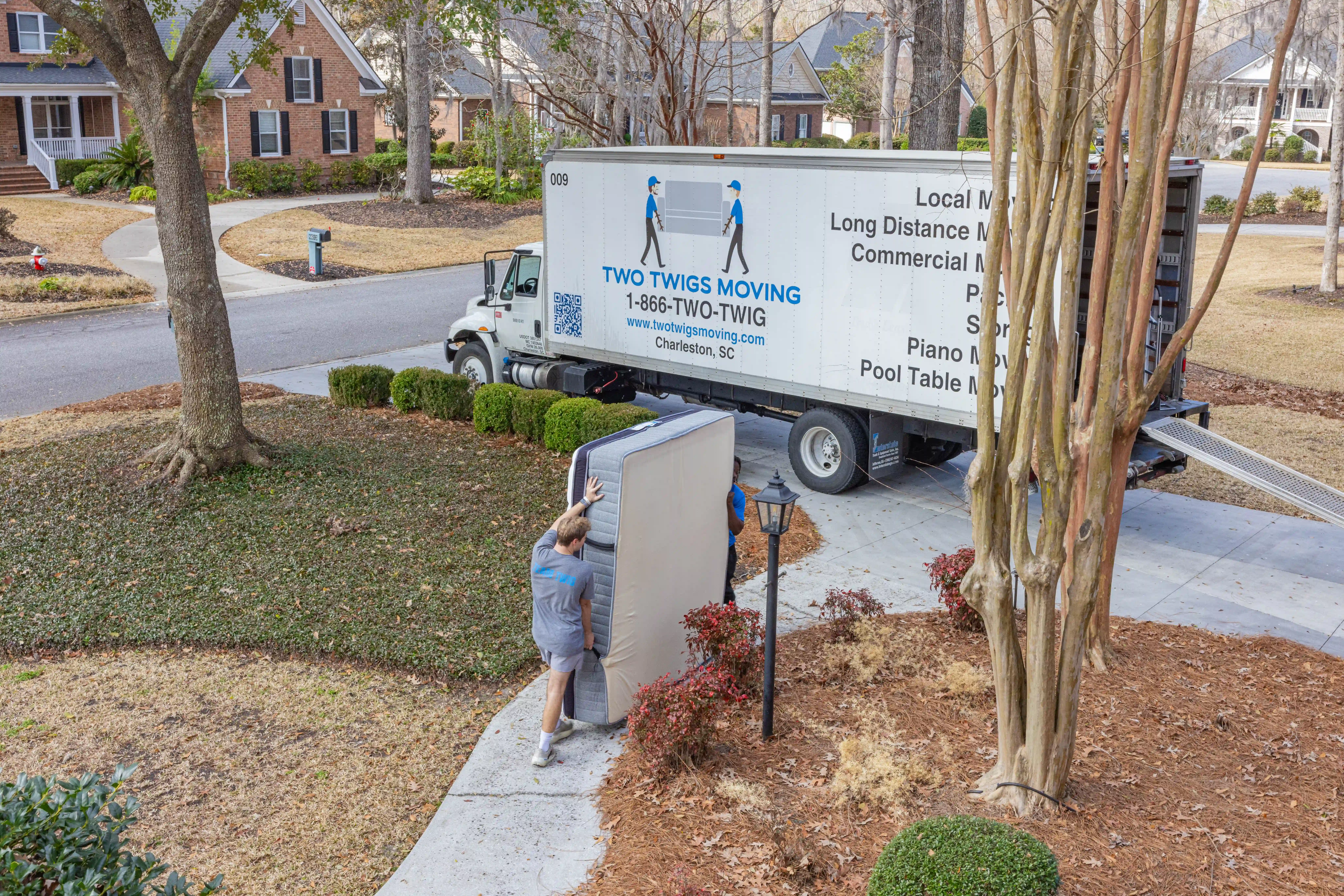Moving long-distance from Charlotte can feel overwhelming, but with the right approach, it’s manageable. Here’s what you need to know:
- Start Early: Plan 6–8 weeks ahead to book movers, transfer utilities, and handle paperwork.
- Understand Costs: Expect costs between $2,200–$16,900 depending on distance, services, and timing.
- Choose Reliable Movers: Verify licensing (USDOT number), insurance, and reviews. Avoid companies offering vague quotes.
- Charlotte-Specific Challenges: Traffic, weather, and limited parking in areas like Uptown can complicate logistics.
- Timing Matters: Avoid peak moving season (May–September) for better rates and availability.
- Prepare for Moving Day: Pack an essentials kit, confirm details with movers, and notify utilities and neighbors.
Proper planning and hiring experienced movers like Two Twigs Moving can simplify your relocation. Focus on budgeting, packing, and finalizing details to ensure a smooth transition.
Long-Distance Moving Basics
Before diving into budgets or picking a moving company, it’s important to understand the essentials of long-distance moves.
What Counts as a Long-Distance Move?
If your move crosses state lines – say, from Charlotte to Columbia – it’s considered long-distance. Even moves within the same state can sometimes fall into this category, depending on the distance involved. Some moving companies also differentiate between long-distance and cross-country moves based on mileage.
Moving From Charlotte: Local Factors
Charlotte’s location at the crossroads of major interstate highways offers both advantages and challenges for long-distance moves. Interstate 77 (running north–south) and Interstate 85 (providing northeast–southwest access) make highway travel convenient, but traffic congestion during peak hours can slow things down.
Weather is another factor to keep in mind. Summers in Charlotte are hot and often accompanied by thunderstorms, while winters, though mild, can bring occasional ice. Many movers recommend scheduling your move during the cooler months of spring or fall to avoid weather-related issues.
Local logistics can also play a big role. Charlotte’s rapid growth has led to neighborhoods like South End, NoDa, and the University area developing narrow streets and limited parking, which can complicate moving trucks’ access. In Uptown, high-rise buildings often require elevator reservations and have specific moving-hour restrictions. Some buildings may even charge elevator access fees or require permits. If you’re moving downtown, it’s a good idea to coordinate with building management well in advance to avoid any surprises.
Why You Need to Start Planning Early
Getting a head start on your plans can make all the difference in a successful long-distance move from Charlotte. Booking movers early often secures better rates and ensures you have access to reputable companies, especially during Charlotte’s busy moving season.
Interstate moves come with additional requirements, such as providing a "Your Rights and Responsibilities When You Move" booklet, arranging for an in-home estimate for higher-value moves, and filing necessary paperwork with the Department of Transportation. Starting early allows you to handle these details without feeling rushed.
Utility transfers and address changes can also take time. Disconnecting services in Charlotte and setting them up at your new home often involves different timelines depending on the provider. Similarly, transferring school and medical records can take several weeks, so it’s smart to begin these processes well in advance.
Once you’ve outlined your timeline and handled these initial steps, the next priority is selecting the right professional movers for your needs.
How to Pick Movers in Charlotte
Choosing the right moving company is a crucial step in ensuring your long-distance move from Charlotte goes off without a hitch. With so many options available, understanding what to prioritize can help you avoid unnecessary headaches and keep your belongings safe during the journey to your new home.
What to Look for in a Moving Company
When evaluating potential movers, there are a few non-negotiables to keep in mind:
- Proper licensing and insurance: For interstate moves, companies must have a U.S. Department of Transportation (USDOT) number. You can verify this through the USDOT’s website to confirm the company is properly licensed. Additionally, make sure they offer insurance. Most reputable movers provide basic liability coverage and optional full-value protection. Always request written proof of insurance before committing.
- Reputation and reviews: A company’s track record speaks volumes. Check platforms like the Better Business Bureau, Google reviews, and specialized moving review websites. Pay close attention to how movers handle complaints or negative feedback – it’s often a good indicator of their professionalism.
- Transparent pricing: Reliable movers will provide detailed, written estimates after assessing your belongings. This evaluation can be done through an in-home visit or a thorough virtual survey. Be wary of companies that offer quotes over the phone without seeing your items or demand large upfront payments.
- Professional behavior: First impressions matter. Trustworthy movers arrive on time, wear uniforms, and conduct detailed inventories. For interstate moves, they should also provide the "Your Rights and Responsibilities When You Move" booklet, as required by law.
Among the many companies meeting these standards, Two Twigs Moving stands out for its commitment to quality and personalized service.
Two Twigs Moving: Services and Benefits

Two Twigs Moving offers a range of services designed to meet the needs of Charlotte residents and those in surrounding areas. Their flexibility allows you to tailor the moving experience to your specific requirements.
For residential moves, they handle everything from small apartments to large family homes. Their team is experienced in disassembling and reassembling furniture and uses professional packing materials to ensure your belongings are protected during transport.
If you have specialty items, such as pianos or pool tables, Two Twigs Moving has the expertise and equipment to handle these challenges. These items require special care, and their team is trained to manage them safely.
They also offer office moving services for businesses relocating to new spaces. Whether you need full-service assistance, labor-only help, or temporary storage solutions, Two Twigs Moving provides flexible options to address the unique needs of long-distance moves.
Every member of their team undergoes a background check, giving you peace of mind that your belongings are in trustworthy hands. Their customizable packages ensure you only pay for the services you need, whether it’s packing, transportation, or specialized handling.
Benefits of Hiring Professional Movers
Hiring professional movers offers a range of advantages that make the moving process smoother and less stressful.
- Time savings: Professional movers can complete tasks in hours that might take you and your family days to finish. This efficiency is especially valuable during long-distance relocations.
- Safety: Moving heavy or bulky items can be risky. Professionals use the right tools – dollies, straps, and padding – to move your belongings safely, reducing the chances of injuries or damage.
- Liability protection: If something goes wrong, professional movers’ insurance policies typically cover damages, sparing you from financial loss.
- Stress reduction: Moving can feel overwhelming, especially when relocating long distances. By leaving the heavy lifting and logistics to professionals, you can focus on other important aspects of your move.
- Expertise and equipment: From wrapping furniture properly to loading the truck for balanced weight distribution, professional movers bring the know-how and tools needed to ensure your belongings arrive intact.
With the right movers, your transition from Charlotte can be a seamless and hassle-free experience.
How Much Your Long-Distance Move Will Cost
Understanding your moving costs upfront can help you avoid any unwelcome surprises. The total cost of a move depends on factors like distance, timing, and the services you choose. Here’s a detailed breakdown of common expenses and tips for setting your budget, following our earlier advice on picking the right movers.
Common Moving Expenses
Your moving bill typically includes several components: labor, transportation, packing materials, insurance, and storage fees.
- Labor costs cover tasks like packing, loading, transporting, and unloading. For long-distance moves, these costs might also include travel time and overnight charges.
- Transportation fees are based on the distance you’re moving, fuel costs, and the size of the truck. These are often calculated using the mileage and weight of your belongings.
- Packing materials can add up quickly, especially for long-distance moves. Supplies like sturdy boxes, bubble wrap, packing paper, tape, and specialty containers for fragile items can vary in price depending on the size of your home and the number of delicate items you need to pack.
- Insurance coverage is essential to protect your belongings during transit. Basic liability coverage is usually included, but full-value protection costs extra – around $6 per $1,000 of declared value. For instance, insuring a $50,000 household would cost about $300 for comprehensive coverage.
- Storage fees may come into play if your new home isn’t ready when your belongings arrive. Short-term storage can range from $100 to $400 per month, depending on the space required and local rates.
Other potential costs to factor in include specialty item handling for things like pianos, pool tables, or artwork, as well as temporary lodging during multi-day moves and utility setup fees at your new home.
How to Set Your Moving Budget
To create a realistic moving budget, start by gathering detailed estimates from multiple moving companies. Opt for in-home or virtual assessments rather than phone quotes, which can sometimes underestimate the actual costs.
It’s wise to budget an additional 10-20% above your highest estimate to cover unexpected expenses. Extra packing materials, unforeseen challenges like narrow staircases, or other surprises on moving day can quickly add to your bill. Having this financial cushion can help reduce stress.
The timing of your move also plays a big role in costs. Rates are generally higher during the summer months (June through August), which is the peak moving season. To save money, consider scheduling your move during off-peak periods, such as mid-month or weekdays instead of weekends.
Start saving early and set aside a dedicated fund for your move. For a typical long-distance move from Charlotte, most households find that a budget between $2,500 and $8,000 is a reasonable range. The final cost will depend on factors like the size of your home, the distance, and the level of service you choose.
Two Twigs Moving Pricing Options
Two Twigs Moving offers a range of flexible plans to fit different budgets and needs. Their custom quotes ensure you only pay for the services you require.
| Service Plan | What’s Included | Best For |
|---|---|---|
| Basic Moving | Loading, transportation, unloading | Budget-friendly moves where you pack |
| Full-Service Move | Packing, loading, transportation, unloading, unpacking | Hassle-free moves with minimal effort |
| Specialty Moving | Piano moving, pool table moving, fragile item handling | Homes with delicate or high-value items |
| Labor Only | Loading and unloading assistance | When you rent a truck but need help |
| Storage Solutions | Short-term storage in secure facilities | Moves with timing gaps |
The Basic Moving package is a cost-effective option for those who prefer to handle their own packing but need professional help with the heavy lifting and transportation.
The Full-Service Move covers everything from securely packing your dishes to setting up furniture in your new home. While it may cost more upfront, it can save you time and reduce stress.
Specialty Moving services are perfect for items that need extra care. Two Twigs Moving is equipped to handle challenging pieces like pianos and pool tables with the attention they require.
If you’ve rented a truck but need professional assistance with loading and unloading, the Labor Only option can save you money while ensuring your belongings are handled properly.
For situations where your move-out and move-in dates don’t align, Storage Solutions provide secure, short-term storage options to bridge the gap.
All service plans include background-checked movers and customizable options, so you can tailor the experience to your budget and needs. Reach out to Two Twigs Moving for a personalized quote.
sbb-itb-a5538b6
Packing and Getting Ready for Moving Day
Getting everything in place before moving day is key to making the transition to your new home as smooth as possible. From sorting out final logistics to prepping essential items and ensuring both your old and new homes are ready, these last steps can help you avoid unexpected hiccups.
Final Steps Before Moving Day
- Confirm all the details: Double-check the moving date, time, and addresses with your moving company to avoid any confusion.
- Update your address: Notify the postal service, banks, insurance providers, and other important organizations about your change of address.
- Handle utilities: Schedule the disconnection of utilities at your current home and ensure essential services are ready to go at your new place.
- Pack an essentials kit: Put together a bag with items you’ll need right away, like medications, toiletries, a change of clothes, snacks, water, phone chargers, and important documents.
- Prepare your home: Clear pathways for movers, protect floors with covers, and get appliances ready – defrost and clean your refrigerator at least 24 hours before moving.
- Notify your neighbors: Let them know about any potential parking disruptions and ensure you’ve secured any necessary permits.
- Have cash on hand: Keep some cash available if you plan to tip the movers.
Conclusion: Your Long-Distance Move Checklist
Planning a long-distance move from Charlotte doesn’t have to feel overwhelming. With early preparation, thoughtful budgeting, and the right moving partner, you can make the process much smoother. The trick is to break things down into manageable steps and stay on top of each phase of your relocation.
A well-planned budget and a reliable moving company are the cornerstones of a successful move. Be sure to account for all potential costs, and request detailed quotes so you know exactly what services are included. A team like Two Twigs Moving can handle everything from packing to delivery, giving you the expertise and peace of mind you need during this transition.
As you finalize your plans, review the basics: your timeline, choice of movers, and budgeting strategy. Keep all important documents in one secure place and create a detailed inventory of your belongings. In the final two weeks before moving day, focus on tying up loose ends – use up perishable items, return anything you’ve borrowed, and pack an essentials kit with medications, key documents, and other must-haves for your first days in your new home.
Here’s a quick checklist to keep you on track:
- Start early: Begin planning 6–8 weeks before your move.
- Budget carefully: Factor in costs like moving services, packing supplies, travel, and utility deposits.
- Hire professionals: Choose a licensed and insured company like Two Twigs Moving.
- Organize documents: Keep important papers handy and make an inventory of your items.
- Handle logistics: Update your address, transfer utilities, and check if you need any permits.
- Pack smartly: Use quality packing materials and prepare an essentials kit for immediate needs.
- Prepare both homes: Clear pathways, protect floors, and ensure utilities are ready at your new place.
- Finalize details: Confirm arrangements with movers, use up perishables, and have cash on hand for tips.
FAQs
How can I prepare for unexpected challenges during a long-distance move from Charlotte?
Unexpected surprises can pop up during a long-distance move, but a little preparation can go a long way in keeping things on track. One smart move? Set aside a contingency budget for unexpected costs, like extra storage fees or last-minute purchases. Also, leave some wiggle room in your schedule to handle potential delays caused by things like bad weather or logistical hiccups.
It’s also a good idea to have both digital and physical copies of important documents – think contracts, IDs, or anything else you might need in a pinch. And don’t forget to pack an essentials bag with must-haves like toiletries, medications, a change of clothes, and chargers. By staying organized and ready to adapt, you’ll be better equipped to handle any curveballs that come your way.
How can I work with my building management in Charlotte to handle moving logistics in areas with tight streets or limited parking?
To make your move in Charlotte as hassle-free as possible – especially in neighborhoods with tight streets or limited parking – it’s important to plan ahead and coordinate with your building management. Reach out early to discuss any specific rules for moving trucks or designated loading zones. Find out if you need to reserve elevators or loading docks to prevent scheduling conflicts with other residents.
Additionally, if your move involves an oversized truck, you might need a permit from the Charlotte Department of Transportation (CDOT). Be sure to submit the application at least 10 business days before your moving date to allow enough time for approval. This ensures your truck can legally and smoothly access the area without causing unnecessary disruptions. A little early planning and clear communication can save you from unexpected headaches!
What are the advantages of moving during off-peak seasons, and how can it save you money and time?
Moving between October and April – commonly considered the off-peak season – comes with some clear perks. One big advantage? Lower costs. Moving companies often drop their rates during these months because demand is lower. This could mean savings of 20% to 40% compared to what you’d pay during busier times.
Another bonus is the increased availability of movers. With fewer people relocating, you’ll have more flexibility to pick dates that work best for you. Plus, the whole process tends to feel less hectic since there’s less competition for trucks, equipment, and professional help. If your schedule is flexible, choosing to move during the off-season can help you save money and reduce stress.


.svg)


